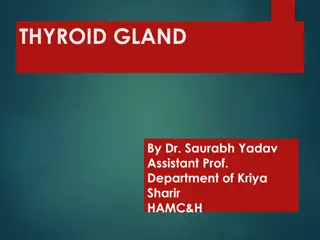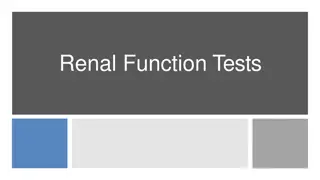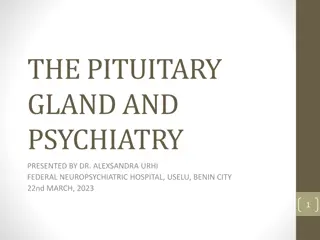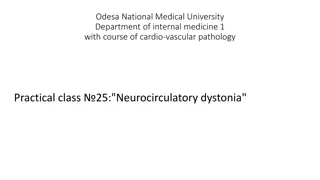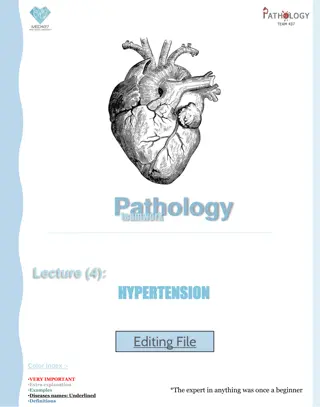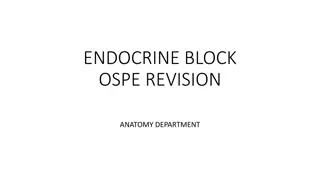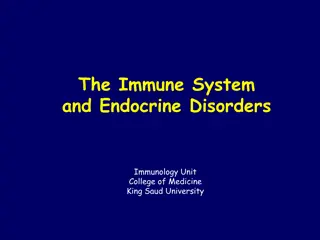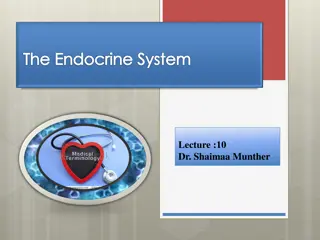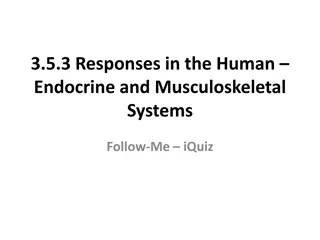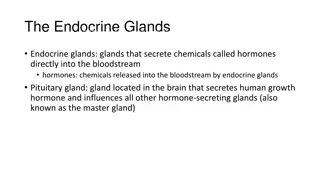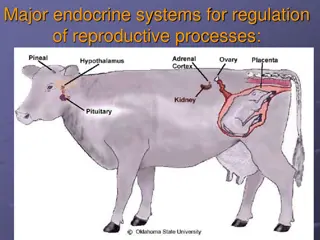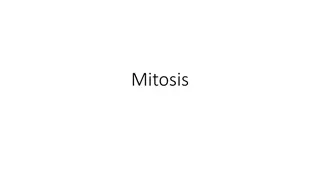Understanding Diseases Associated with Homeostasis in Endocrine, Nervous, Immunological, and Genetic Levels
Exploring diseases related to disruptions in homeostasis at endocrine, nervous, immunological, and genetic levels, focusing on conditions like hormone imbalances and metabolic disorders such as growth hormone deficiency and diabetes. Learn about the impact on health and the body's intricate regulato
5 views • 38 slides
Understanding Pituitary Gland Functions in Endocrinology Course
Explore the intricate workings of the pituitary gland in endocrinology, delving into hypo- and hyperfunction aspects, hormonal regulation, and physiological characteristics. Learn about the crucial role of hormones, their actions on target organs, and the specificity of their interactions with cellu
6 views • 71 slides
Understanding Reproductive Hormones in Males and Females
Reproductive hormones play crucial roles in the body, acting as chemical signals released by endocrine cells. In males, hormones like testosterone, gonadotropin, and estrogen regulate various functions related to reproduction. Similarly, in females, hormones like GnRH, FSH, and LH are essential for
6 views • 16 slides
Comprehensive Overview of Pancreas Function and Structure
Pancreas is a vital organ in the abdomen with dual exocrine and endocrine functions. As an exocrine organ, it secretes digestive enzymes and bicarbonates into the duodenum for food breakdown. In its endocrine role, the pancreas regulates blood sugar levels by secreting insulin, glucagon, somatostati
1 views • 16 slides
Cutaneous Manifestations of Systemic Diseases: Endocrine Disorders and Diabetes Mellitus
Explore the cutaneous manifestations of systemic diseases, particularly focusing on endocrine disorders like diabetes mellitus. Learn about the dermatologic signs associated with conditions such as hypothyroidism, hyperthyroidism, Addison's disease, and Cushing syndrome. Discover specific manifestat
0 views • 88 slides
Understanding Glandular Epithelium and Secretory Cells
Glandular epithelium consists of epithelial cells specialized in producing and secreting various macromolecules, found in glands throughout the body. These secretory cells can synthesize proteins, lipids, and carbohydrates, with different types of glands such as exocrine and endocrine glands. The se
0 views • 13 slides
Understanding the Thyroid Gland: Functions and Hormone Synthesis
The thyroid gland is a vital endocrine gland located below the larynx, responsible for producing thyroid hormones essential for regulating metabolism. This gland consists of follicles lined with follicular cells, producing thyroglobulin and thyroid hormones T3 and T4. Iodine plays a crucial role in
0 views • 40 slides
Understanding Renal Function Tests and Kidney Health
Renal function tests are essential for diagnosing and monitoring kidney health. These tests assess functions like glomerular filtration, tubular reabsorption, and endocrine functions of the kidneys. Common indicators include serum urea, creatinine levels, and more. It's crucial to evaluate renal fun
0 views • 34 slides
Understanding Shock and Blood Transfusion in Surgery
Shock is a state of low tissue perfusion leading to metabolic changes like anaerobic metabolism and acidosis. As cellular hypoxia progresses, immune and coagulation responses are activated, impacting cardiovascular, respiratory, renal, and endocrine systems. Shock can be classified into hypovolaemic
0 views • 38 slides
Understanding the Pituitary Gland: Implications in Psychiatry
This presentation by Dr. Alexsandra Urhi delves into the anatomy, function, and psychiatric implications of the pituitary gland. It explores the interplay between endocrine structures, the CNS, and psychotropic drugs' effects on the pituitary gland.
0 views • 35 slides
Understanding Neurocirculatory Dystonia: Causes, Types, and Symptoms
Neurocirculatory dystonia is a condition characterized by a permanent impairment of nervous regulation of vascular tone, impacting blood pressure and cardiac muscle. Triggered by various stressors, the disease presents different types such as cardiac, hypertonic, hypotonic, and mixed. Symptoms inclu
2 views • 11 slides
Understanding Factors Influencing Estrus Cycle Length in Veterinary Science
Factors affecting the length of estrus cycle in animals, such as luteolysis, endocrine control, release of PGF2, and hormonal regulation, play crucial roles in determining the cyclicity and fertility of female animals. This comprehensive study delves into the intricate mechanisms involved in estrus
0 views • 17 slides
Hormonal Control in Animals: GCSE Biology Lesson
Explore the fascinating world of hormonal control in animals through this GCSE Biology lesson. Learn about hormones, the endocrine system, glands, and their roles in maintaining homeostasis. Understand the advantages and disadvantages of hormonal coordination, and study specific hormones and their f
0 views • 29 slides
Understanding Hypertension: Causes, Classification, and Complications
Hypertension, a common yet serious health issue, is explored in detail in this lecture. The etiology, risk factors, and complications of hypertension are discussed, along with the classification into primary, secondary, benign, and malignant hypertension. The lecture also covers causes of secondary
1 views • 13 slides
Overview of Pituitary Gland: Structure, Function, and Relationships
The pituitary gland, also known as the hypophysis, is an endocrine gland located at the base of the brain. It is divided into two main parts: the adenohypophysis and the neurohypophysis. The gland plays a crucial role in hormone regulation and is closely related to neighboring structures such as the
0 views • 26 slides
Understanding Adrenal Androgens and Their Role in the Endocrine System
Explore the significance of adrenal androgens in the endocrine system, including their production, function, and impact on male and female physiology. Learn about conditions like adrenogenital syndrome and the crucial role of adrenal cortex in hormone synthesis.
0 views • 14 slides
Overview of Shock Classifications and Causes
Shock is classified into different types such as Hypovolemic, Cardiogenic, Obstructive, Distributive, and Endocrine shock. Hypovolemic shock results from fluid loss, while Cardiogenic shock is due to heart failure. Obstructive shock occurs from mechanical obstructions, whereas Distributive shock is
1 views • 11 slides
Overview of Human Endocrine System in Life Sciences Presentation
This content provides a detailed examination guideline for understanding the human endocrine system in the field of life sciences. It covers essential topics such as the difference between endocrine and exocrine glands, hormone functions, gland locations with functions, and key terminology related t
1 views • 17 slides
Endocrine Block OSPE Revision - Anatomy Department Presentation Slides
Explore this set of presentation slides prepared by the Anatomy Department for Endocrine Block OSPE Revision. The slides cover essential topics related to endocrine anatomical structures and functions, providing a comprehensive resource for revision and review.
0 views • 11 slides
Extended Endocrine Therapy Guidelines for Breast Cancer Patients
Extended adjuvant endocrine therapy may benefit breast cancer patients with poor or intermediate prognosis, but may have little value for those with good prognosis. Risks include osteoporosis and venous thromboembolism. Different treatment options are available for postmenopausal and premenopausal w
0 views • 9 slides
Understanding Glands: Endocrine and Exocrine Systems
Glands play a crucial role in the body by producing and releasing substances for specific functions. Endocrine glands release hormones directly into the bloodstream, while exocrine glands secrete substances through ducts onto bodily surfaces. Different types of exocrine glands, such as sweat glands,
3 views • 22 slides
Understanding Endocrine Emergencies and Diabetes Mellitus
The endocrine system plays a crucial role in regulating various bodily functions through hormone release. This presentation by Mrs. Bincy Cherian delves into endocrine emergencies, specifically focusing on Diabetes Mellitus. It explains the differences between Type I and Type II diabetes, their clin
3 views • 28 slides
AHNS Endocrine Surgery Section Guidelines: Perioperative Pain Management and Opioid Reduction
The American Head and Neck Society Endocrine Surgery Section provides consensus statements on perioperative pain management and opioid reduction in head and neck endocrine surgery. Addressing the opioid addiction crisis, the expert panel offers guidelines on pain management strategies, opioid prescr
0 views • 18 slides
Understanding Hormones and their Role in the Body
Hormones are chemical messengers that play a crucial role in regulating various metabolic functions in the body. They are transported through the bloodstream to tissues and organs, affecting processes like growth, metabolism, and reproduction. Some hormones have autocrine and paracrine effects in ad
0 views • 25 slides
Exploring the Endocrine System as the Third Temple of our Body
Delve into the fascinating connections between the endocrine system and biblical references, likening its functions to the operations of the Tribe of Asher. Discover how this system, composed of glands producing hormones, impacts growth, metabolism, and sexual development. Explore the intricate netw
0 views • 24 slides
Understanding the Interplay of the Immune System and Endocrine Disorders
Explore the intricate mechanisms of immunological damage to endocrine glands, focusing on disorders like Graves disease, Hashimoto's thyroiditis, type I diabetes, and Addison's disease. Delve into the association of autoantibodies with pathogenic and diagnostic significance, uncovering the complexit
0 views • 33 slides
Endocrine Potpourri: Adrenal Insufficiency and Incidentalomas - Case-Based Review
This endocrine potpourri covers various cases involving adrenal insufficiency, adrenal crisis, adrenal incidentalomas, and patient education. It includes a detailed case presentation, treatment guidelines for adrenal crisis, patient education on adrenal insufficiency, and evaluation of adrenal nodul
0 views • 62 slides
Understanding the Endocrine System: Key Concepts and Functions
The endocrine system, consisting of glands that release hormones into the bloodstream, plays a crucial role in regulating various body processes like metabolism, growth, reproduction, and stress response. Key glands include the pituitary, thyroid, pancreas, adrenal, ovaries, and testes, each produci
0 views • 34 slides
Metastatic Breast Cancer Treatment and Progression Overview
Mrs. GV, a 78-year-old woman with endocrine-resistant hormone-positive metastatic breast cancer, presented with dyspnea. Her medical history includes chronic fatigue syndrome, hypothyroidism, and hypertension. Disease progression led to dermal and intraocular metastasis, managed with treatments like
0 views • 16 slides
Understanding Responses in Human Endocrine and Musculoskeletal Systems
This interactive quiz explores key concepts related to the human endocrine and musculoskeletal systems, including exocrine glands, bone structures, hormone functions, and more. Test your knowledge on these vital systems and their responses through engaging questions and answers.
0 views • 50 slides
Understanding How Hormones Interact: The Endocrine System
The endocrine system comprises glands that release hormones into the bloodstream, influencing various bodily functions. Key glands include the pituitary, pineal, thyroid, pancreas, gonads, and adrenal glands, each playing a crucial role in regulating metabolism, growth, stress response, and reproduc
0 views • 5 slides
Understanding the Endocrine System: Hormones, Glands, and Regulation
The endocrine system, comprising glands such as the pituitary, thyroid, pancreas, and more, produces hormones that regulate various bodily functions. These hormones target specific cells with receptors, influencing metabolism, growth, energy usage, and more. By understanding how hormones interact wi
0 views • 12 slides
Understanding the Endocrine System: Glands and Hormones in Detail
Explore the intricate details of the endocrine system, focusing on key glands like the thyroid, parathyroid, adrenal, pancreas, and thymus, their functions, hormone secretion, and role in maintaining physiological balance through hormonal regulation mechanisms.
0 views • 13 slides
Understanding the Endocrine System: Functions, Organs, and Disorders
The endocrine system, essential for bodily functions and growth, consists of key parts such as the hypothalamus, pituitary gland, thyroid gland, and more. It helps maintain homeostasis and can be affected by environmental factors like drugs and stress, leading to conditions such as Cushing syndrome.
0 views • 9 slides
Understanding the Endocrine System: Functions and Glands Explained
Explore the intricacies of the endocrine system with a focus on its functions such as metabolism, growth, emotions, and more. Learn about key endocrine glands like the hypothalamus and pituitary, their roles in hormone regulation, and their impact on various bodily processes. Discover the significan
0 views • 17 slides
Overview of the Human Endocrine System
This presentation covers the terminology, differences between exocrine and endocrine glands, the location and functions of various glands in the endocrine system, and general information on how hormones coordinate the body's organs to maintain homeostasis.
0 views • 17 slides
New Horizon for Overcoming Hormonal Treatment Resistance in Metastatic Breast Cancer Patients
Breast cancer, particularly estrogen receptor-positive tumors, poses a significant challenge due to endocrine resistance. While endocrine therapy is effective, resistance can occur in both early and advanced stages of the disease. This presentation discusses novel approaches to address this resistan
0 views • 21 slides
Endocrine Systems in Reproductive Regulation
The endocrine system plays a crucial role in regulating reproductive processes by secreting hormones that influence cellular activity. This system involves ductless glands like the hypothalamus, pituitary gland, and other endocrine glands working together in a feedback mechanism. Hormones of various
0 views • 19 slides
Exploring the Intricacies of Mitosis, Neurons, and Endocrine System
Delve into the world of biology and neuroscience with detailed images depicting mitosis, chromatids, equator, spindle fibres, diploid and haploid cells. Explore the journey from stem cells to tissues and organs, including the Central Nervous System (CNS) components like cerebellum, cerebrum, and med
0 views • 72 slides
Overview of Endocrinology: Coordination of Body Functions by Chemical Messengers
The body's functions are coordinated by various chemical messenger systems, including neurotransmitters, endocrine hormones, neuroendocrine hormones, paracrines, autocrines, and cytokines. Endocrine hormones travel through the circulatory system, binding to receptors in cells to regulate metabolism,
0 views • 18 slides






